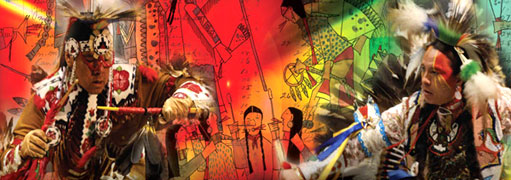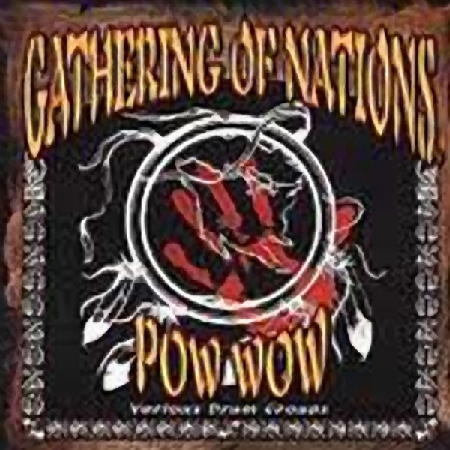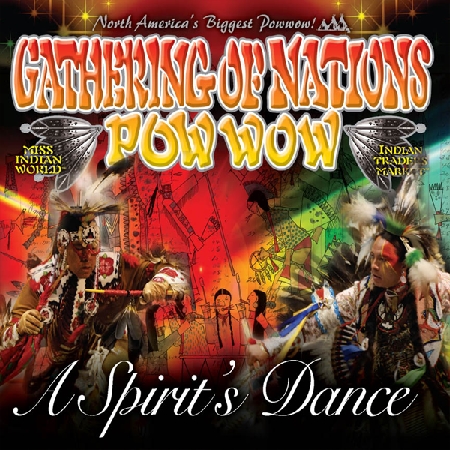Those little trophies are heavy. They must weigh about 15 pounds, laughs Melissa Sanchez. She should know. She helped organize their arrival in Albuquerque for a presentation at the Gathering of Nations this year.Back in in 2001, the Gathering of Nations’ compilation CD won the first Grammy ever presented for Best Native American Music Album. A decade later, it won the last. The Recording Academy announced in early April that it was removing 31 categories from the list of awards. Among them: Native American, Cajun and Hawaiian. Those will be lumped into Regional Roots Music. Sanchez’ company, Emergence Productions, specializes in Native music and coordinates the performances for the Gathering. The biggest problem with the Regional Roots generalization, she says, is that it tries to blur all those genres together. And the word "roots" almost makes it sound like reggae, she says. "I don’t know where they came up with that." Plus, when nominations are announced, there’s a lot of exposure for musicians. Removing the category could mean fewer Native artists get that spotlight. The Alibi got a chance to talk to Sanchez about the ripples from the Recording Academy’s decision. What did it mean to people when the Native American category was introduced in 2001? I think it was a coup. It was really exciting because it would be a recognition of the types of Native American music that are out there. It’s so diverse. It was also in a few of our minds in the industry: How will this carry through because of the diversity? You have traditional music, traditional mixed with contemporary—it just goes on and on. Those were some of the first questions, but overall, the category being included was a victory. That’s one of the criticisms people have had of the category—it includes such a big scope of styles. What do you think about that? It would be difficult as a person who’s voting on that particular category. Also seeing it from the artists’ side: What are they looking for, exactly? There really can’t be any specifics on the criteria for the category. It’s always going to be difficult. But it is what it is. Was there a learning curve when people were initially trying to figure out the rules? Oh, yes. The bad part about the timing for the demise of the category is that with Gathering of Nations’ win this year, it brought so much exposure. Awareness went up. People became curious about the process: “Well, how do I get in?" They were getting inspired to learn how to submit and learn how to play the Grammy game. So this was a blow in that sense. Do you have any good Grammy stories? The first one was really exciting because it was awarded on TV. That was really cool. Who went to receive the award that year? It was the producer Tom Bee, who owns Soar Records. That’s an Albuquerque company. So that’s who actually got onstage and picked up the Grammy when it was first established. On a side note, Gathering of Nations moved on to create their own music label. From there on, Gathering has produced its own music.I have always watched who wins as it is broadcast online. I was able to see live broadcast of afternoon awards, which is where the Native American award is. I think everybody always looked forward to hearing who was nominated for the Grammy. That always became big news within Native American media and communities. Do you think anyone expected the Recording Academy to cut the category? Was there a rumor that it might happen? I think it was out of left field. I’m a New Mexico music commissioner, and we’ve held several forums with some of the Grammy executives coming out to New Mexico. What was said in those forums is that there needed to be more involvement, especially in our Southwest region. That wasn’t just for Native American music, it was for New Mexico music. Anybody who was in the music industry, we needed to educate ourselves on the Grammy process and become involved as voting members. Knowing that part of it, and hearing about the drop of the category—I understand, but I wish it hadn’t happened to any of the categories. What was your reaction? I was disappointed. It’s just one of those things: If only we had more time. But who’s to say it’s over? There might be an opportunity to lobby. This might bring awareness of our own genre, that we all need to go back to the basics, educate ourselves on this process and make an impact. Is it insulting that the category was removed? I don’t think it was meant as an insult. I just think they were, on their part, cleaning Grammy house. Do you think the change will prevent some Native artists from being nominated? There’s been already Native American artists who are Grammy winners, such as Bill Miller and Carlos Nakai, in other categories. For the type of music Regional Roots has to encompass, it might be a deterrent for some of the artists. It might not appeal to them to be categorized this way. On the flip side, when we work with our artists, we always are encouraging them to become the best they possibly can and get past the glass ceiling. You just are artists who happen to be Native American or indigenous or aboriginal Canadian. So go out there and knock them dead with your style. There isn’t a reason why we can’t all compete in mainstream categories. It’s just a bigger game.
The Gathering of Nations Grammy presentation will take place after the Grand Entry (which starts at noon) on Friday, April 29, in The Pit.








